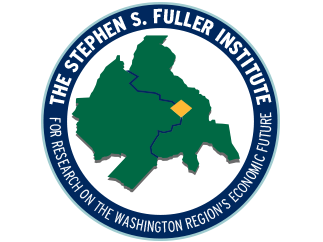From The Washington Post:
By Jonathan Aberman
Economic growth doesn’t just happen; it results from successful strategy and execution. A growing number of people in greater Washington believe that future economic growth will come from overseas – if the right choices are made.
From 1980 until now, economic growth in our region has been tightly tied to increases in federal spending, especially in federal government procurement. D.C. really has been a company town.
Stephen Fuller, university professor of public policy at the Schar School of Policy and Government at George Mason University, has followed this interdependence for years. Since federal spending in our region peaked in 2010, the region’s annual growth rate has been less than 1 percent. Fuller is concerned that even this growth rate may be difficult to achieve in the future, as he expects government spending in our region to continue to decline – from 40 percent of our region’s economy in 2010 to 30 percent by 2022. To him, the strategic choice is simple: “We need to diversify away from our historic federal dependence.”
Fuller suggests one place to look for economic growth is outside the United States. He points to greater Washington’s concentration of international organizations and consulates as the catalyst for a professional sector that is comfortable doing business overseas. Looking for clients and sales abroad is a natural fit for these individuals, Fuller points out, since they “use the same skill sets and professional services developed in the federal market place.”
It is not just professional services that can leverage international opportunities. Our region creates many sought-after products. For example, many of our region’s leading cybersecurity companies sell their products abroad, and our local life science industry has a heavy international component. Virginia wines are finding their way onto many tables overseas, and numerous local small businesses are achieving international sales.
Nevertheless, to date greater Washington has not taken full advantage of international trade. According to the Global Cities Initiative, a comprehensive analysis of international trade and economic development, our region ranks 95th out of the 100 largest metropolitan areas in the United States in export performance.
Is this something we should address? Chuck Bean, executive director of the Metropolitan Washington Council of Governments, thinks so. He points to studies that show that for every $1 billion in international exports, 5700 jobs are created. Exports will grow our economy.
However, there are significant barriers. As someone who has done business overseas, I know that achieving international business growth requires an appreciation of different cultures and an understanding of significantly different legal requirements. And building awareness of product or service in a new market is a challenge that can’t be dismissed. But all of these barriers can be overcome with time, experience, determination and money. It can be hard for a single business to go it alone.
Fortunately, there is no need to go it alone because there is a high level of commonality in these challenges across businesses. This is an opportunity for regional cooperation and knowledge sharing to make a huge difference. If businesses do not have to reinvent the wheel when they decide to look for growth overseas, the expense and time required for international success can be significantly decreased.
Bob Sweeney, the managing director of the Global Cities Initiative at the Metropolitan Washington Council of Governments, believes that the region needs one thing if it is to have greater international trade success: it needs “a place where businesses can go to learn about the complex world of international trade” and learn of the opportunities and pitfalls from those that have been there, and have succeeded.
For a region that needs to identify and implement a strategy for achieving future growth, helping local business owners look overseas for customers and opportunities is both desirable and achievable.
That is a strategy we can all get behind.
Jonathan Aberman is a business owner, entrepreneur and founder of Tandem NSI, a national community that connects innovators to government agencies. He is host of “What’s Working in Washington” on WFED, a program that highlights business and innovation, and he lectures at the University of Maryland’s Robert H. Smith School of Business.
